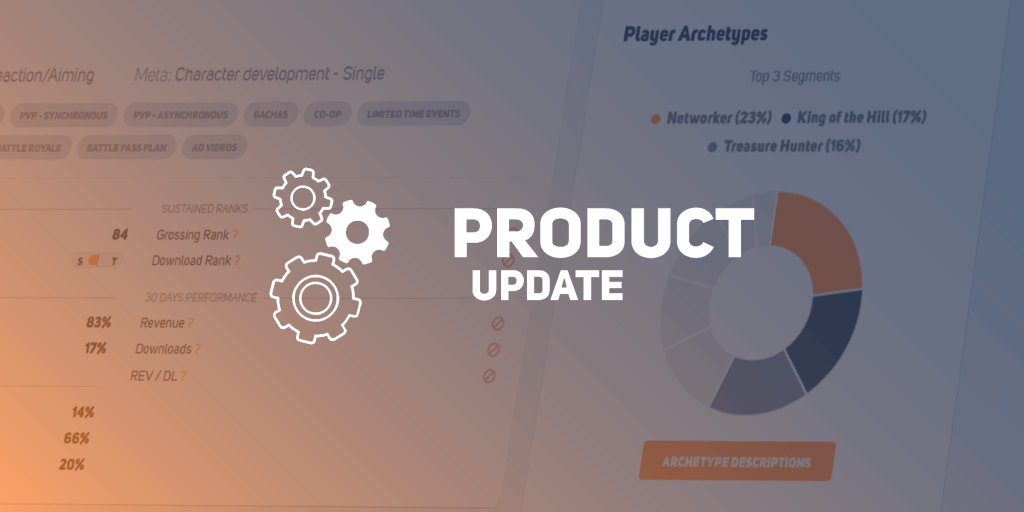In this episode of the Mobile GameDev Playbook, we’re joined by GameRefinery, a Liftoff company analysts Erno Kiiski and Kalle Heikkinen for a special episode looking at the games that won at the Mobile GameDev Awards.
![]()
![]() Spotify, BuzzSprout, TuneInRadio, iHeartRadio
Spotify, BuzzSprout, TuneInRadio, iHeartRadio
– If you enjoy the episode, remember to hit subscribe!
The Mobile GameDev Awards are an annual set of awards by GameRefinery to recognize and celebrate innovation and excellence in mobile games. We will cover what made these games and studios win their respective categories, what aspects GameRefinery examines within a game, and what the future may look like for these games. Some examples include Apex Legends Mobile winning The ‘Most Promising Soft Launch Game’. Several games, such as State of Survival won ‘Biggest Evolver’. Beatstar, along with a few other games, was voted as ‘Best Newcomer’.
You can also watch the episode on YouTube:
Topics we will cover in this episode:
- Introduction
- What are Mobile GameDev Awards?
- Best Newcomer
- Innovation and Excellence in Core Gameplay
- The Most Promising Soft Launch
- Biggest Evolver
- Best Use of IP in a Collaboration Event
- Best Feature Innovation
Read transcript
Introduction
[00:15] Jon Jordan: Hello, and welcome to the Mobile GameDev Playbook. Thanks for tuning in for another episode. This is a podcast all about what makes a great mobile game, what is, and isn’t working for mobile game designers and all the latest trends. I’m your host, Jon Jordan, and we will discuss awards today. In particular, we’re going to be discussing our awards. That’s something to look forward to, and we have two people at the heart of these awards. We have Erno Kiiski, the Chief Game Analyst at GameRefinery by Liftoff. How’s it going, Erno?
[00:45] Erno Kiiski: Hi, Jon. It’s going great. How are you?
[00:46] Jon: Good. We also have Kalle Heikkinen, Senior Market Analyst, also at GameRefinery by Liftoff. How’s it going, Kalle?
[00:52] Kalle Heikkinen: Very good. I just came back from six weeks of maternity leave. So I’m excited to be back.
[00:59] Jon: I thought you were going to say six weeks of holiday, in which case I was going to be very jealous, but six weeks of paternity leave. I was like, “Ooh, the fun has just started.”
[01:06] Kalle: I know. Tell me about it.
What are Mobile GameDev Awards?
[01:07] Jon: Cool. As I said, we’ll be talking about the Mobile GameDev Awards, which are now in their second year. Kalle, tell us about the awards. Why did you start them off, what’s the point of them and who selects the winners? I guess that’s what we care about.
[01:20] Kalle: Yes, for sure. As you mentioned, this is the second year we’re doing the awards. We just wanted to celebrate the games and the game developers, specifically in our industry. The process of selecting the finalists and winners is pretty straightforward. You might have noticed that the categories that we have, some of them are geo-related, and then we have some global categories. Geo-related means that we have a Japanese team that, for example, selects which in-game event was the most engaging or best in the previous year in the Japanese market. Then the global categories are more like we just look at the entire global market and then select what was the best game in that respect. With the geo-separated categories, respective teams went through the games, whether we played in the previous year, discussed which games would be the most suitable nominees, and then decided on the winners. Then for the global categories, we had these cross-team discussions to discuss which game should be the winner.
With these awards, we wanted to consider the unique characteristics of the free-to-play and games service market. That’s why we have these categories like best evolver, best event, and best collaboration event, which are all categories that perhaps you wouldn’t see in more traditional gaming awards. Yes, that’s the idea behind the awards.
[03:07] Jon: Those categories reflect what’s been going on in the last few years where 45 years ago, we thought mobile games were all going to be global, and every game was going to be a hit everywhere. We’ve seen that change, and part of that is to do with live ops and their importance. We always go on about live ops. Simply, that’s the one thing we talk about a lot in this podcast which is so important. Erno, let’s go straight into some categories. We’re going to talk about new best comers. What does the ‘new best comer’ category mean? Do you want to run us through some of that?
Best Newcomer
[03:36] Erno: Yes, of course. The newcomers, what we wanted to highlight there are new entries, especially if we look at the Western markets. We look at the top charts, like, say, the nature of the free-to-play games. Naturally, as we all know, many of these games are played for years and years and years. New entries to the market can be pretty rare, especially on the Western market and those games that break out. Especially those games that can break out and then maybe bring something new or some fresh angle to the market, specific genres, etc.
Naturally, we had multiple choices, for example, for the US, for the time period, for the 2021 new entry games. In the end, we decided to give the award to Beatstar. Anybody who is not aware of Beatstar, it’s a music game. It’s a written-based music game and so on. Why we especially wanted to highlight Beatstar was that the music genre and music type mobile games have in the past been relatively niche in the West. There have been these hyper-casual Magic Tiles, where you play one song, tap in the rhythm, and that’s about it.
The actual game is a really simple and ad-monetized type of hyper-casual experience. We haven’t seen big hits like this bigger music style or music genre games in the West. Beatstar still has quite a casual approach. The focus is on the core gameplay, the rhythm-based completion of the levels, and so on.
But how they incorporated the IAP monetization into the system and the progression system that they took as inspiration from Clash Royale meta mechanics: how you are acquiring the songs, how you are getting further all the time, how you are progressing, and how your catalogue is growing all the time. They were able to find success compared to many others, especially IAP crossing like the music games in the West, which, as I said, is a big feat to be able to find success in this niche genre that has been on mobile. If you look at Japan, especially Japan, the whole music game scene, like the rhythm-based game scene, is massive. There are almost like this RPG type of idol collector type of games where the core gameplay is music, but in the West, they have never really broken through. We haven’t seen a music game as big as Beatstar that was able to break into the market and find big success. That’s why we wanted to highlight that one on the US side of the winners.
[06:55] Jon: It’s good. Having been involved with some awards over the years. As you say, there are always loads of new games, but they’re constantly competing with these games that have been around for like five or six years. You always feel like the newcomer, it’s always a little bit difficult because often they just haven’t been a big enough hit in a mature market, but definitely, Beatstar disproves that role.
It’s interesting, I guess, because Space Ape, the developer, a UK-based company, traditionally had been making a lot of strategy-type games. It wasn’t clear they would be very good at making a mobile music-type game that knocked it out of the park. Cool. Good. That’s our best newcomer. Kalle, we’ll talk about innovation and excellence in core gameplay, a bit of a mouthful, that category. Which game do you want to highlight there?
Innovation and Excellence in Core Gameplay
[07:43] Kalle: We wanted to shout out to Harry Potter: Magic Awakened. This was a game that was released in China last year. It will also have a global release this year in the Americas, Europe, and Oceania, but it’s already out in China, Hong Kong, Macau, and Taiwan, at least. This summer, there was just a beta version test for PC. In China, it started with a very stellar top 10 grossing performance, but it has then been sliding down to top 100 grossing. I just checked that it’s in the top 94 grossing.
It was a big success in China, especially in the first couple of months. I’m very excited to see how it will perform in the West. We just want to highlight some things that make the game great. First, the distinctive art style as well as the story, which is a different storyline than in the books. The storyline happens after the book’s events, but you have a lot of familiar characters in the storyline as well. In a sense, it feels like a little sister of the Harry Potter series.
The art style is very distinguishable. It looks like it got inspiration from Tim Burton movies and sort of dark academia or light academia-inspired looks for the outfits of the player avatars and so on. The core gameplay. It’s very different from other games. You have these tactical battle layers with RPG elements there. That’s a big part of the experience. On top of that, there are rhythm game elements in place. Even racing elements were implemented.
It’s an interesting mixed bag of various core-game play ideas. Then you have this very compelling meta layer there as well. Then, I guess as a final note, I just want to add that the game also has a very deep social aspect to it. There are all kinds of social stuff going on. You have the guilds, but also, for example, a social wall in the game where players can share their fan drawings and things like that.
It’s very interesting, and your player avatar customization is a massive part of the game. That’s also enforced by the live ops that are constantly releasing new outfits and clothing for the players that they can use to dress up the avatar characters. It’s a very interesting game, and looking forward to the global launch.
[10:45] Jon: Yes, it’s funny for such a deep IP that’s been so successful in multiple media. Off the top of my head, there have been loads of Harry Potter games, but it seems to have been, at least in my estimation, one of those IPs that hasn’t had a brilliant game or a game that you feel has gone beyond the source material. I think all the games have been fine, but there’s not one where you go, “Oh, they got the bit of Harry Potter that you could only do in a game.” I’m not saying Magic Awaken will be that one. The art style is amazing. I didn’t realize it was so mixed up in terms of genre. It’s almost like a little Harry Potter mini verse.
[11:27] Kalle: The Match 3 game has been relatively successful. Then there’s this product game that you pay upfront premium game coming up. I can’t recall the name.
[11:39] Erno: Hogwarts Legacy.
[11:41] Kalle: Yes. I think it got delayed to next year or something like that, but that looks like an interesting take on the IP.
[11:50] Erno: Yes. I would say my two cents about that game is that, I would say, overall, the core gameplay, innovative, interesting, engaging core gameplay can be quite rare once in a while. Especially in those more mid-Corish types of genres, very often they are so meta-driven. The core gameplay is maybe nice for a bit, but then it goes out of the grind, and the metagame is the actual game.
When you are progressing there and making your teams and strategizing over there, seeing innovative, fun, and different takes on the core gameplay, especially on mobile, can be quite rare. In my opinion, the Harry Potter combination is a bit different from Clash Royale. Still, it’s like a tactical one-on-one battler type of core gameplay mixed with this kind of a world you’re living in and all those mini-game modes of rhythm games. It stands out from many, many other kinds of similar types of entries in the market.
[13:04] Jon: Without veering too much into politics, I guess the other interesting thing is in the west Harry Potter now, at least it’s a contested IP about what some of the fans think about it, maybe less so in China. Perhaps it’s had a bit of an easier ride over there. Bizarrely, on a personal level, my daughter has started reading Harry Potter books. It’s so interesting. We started watching the films again with some of them.
It’s interesting, whatever you think about the books and the quality of the films. You can see there’s a lot of depth there. I think you just need a game to bring it out in an interesting way. Maybe Magic Awakened is that one. Hopefully, we’ll find out this year. Okay. Moving on to something pretty different. Apex Legends finally made it onto mobile, at least in a soft launch and won the most promising soft launch game. The most promising soft launch game is probably only a category you guys would have.
The Most Promising Soft Launch
[13:55] Erno: The actual awards were handed out a while ago. Apex Legends has been global launched already for a month. We are a bit late on discussing, to be honest.
But we initially chose the game to be one of the most interesting and promising because, for example, I have played Apex Legends on console for hundreds of hours. I was skeptical about how they would execute the same because the game is fast-paced. Mobility is high.
You’re moving, sliding, jumping, and it’s a high-mobility-type shooter game. I was skeptical about how they could nail it on mobile devices. Naturally, I had a similar experience when trying it out on mobile as when Call of Duty mobile came out. They got the feeling of the original game super, super well.
That was super, super impressive. That’s one of the key reasons, naturally, why we wanted to highlight because the actual gameplay is super well-executed to honor the original and so on. Then another part of it is that because we know Respawn naturally develops the game from EA. But, they are also working with Tencent and their Lightspeed and Quantum Studio, the studio that brought PUBG Mobile to the mobile market with the LiveOps of the game.
The building blocks of the game, the actual core gameplay, which is one of the critical things for a Shooter game, especially for a game just monetized around cosmetics, and there’s no getting addicted to the progression loop type of a thing. Instead, it’s just about having fun in individual matches and competing against each other, getting the gameplay feel down so well as they did. That was a big thing.
Then, naturally, in terms of monetization, it’s all about the live ops possibility and the capability of bringing enough content, engaging events and so on. That’s working together with Lightspeed and Quantum. The building blocks, really, really were there. However, we are talking a bit late about this. The game had a really good initial splash, but it has declined. When we’ve been following the game more closely, they haven’t been able to get to the same level of content cadence. For example, Call of Duty and PUBG are pushing content for the players.
We will see in the future whether they can scale it up upwards to catch up or find more stuff they can push out. Apex Legends is a bit behind the top three dominating games in the shooter market: Call of Duty, PUBG, and then Free Fire. Good start, I would say nice start, but in the long run, there are some signs of slowing down quite a bit. We will see if they can get back on track with LiveOps.
[17:24] Jon: It’s always interesting how many shooters or games in any genre can survive in that situation. When something new comes along, and everyone is interested, aren’t they? Everyone stops playing what they’re doing and tries the new one. Still, then I think there’s probably only one or two games that people can play consistently, like, “This is the one I’m doing. I’m making sure I’m getting all the battle pass stuff or the live ops stuff.” if you’re competing with Free Fire, the biggest mobile shooter out there, Call of Duty. PUBG, that’s pretty tough competition.
[17:59] Erno: That’s true. One thing I see for Apex’s strength is that it’s a bit different. If you look at Free Fire or PUBG, for example, they are close to each other. Then with Apex, we had a different type of pacing. Most importantly, it’s a class-based shooter. You’re playing with the character classes and stuff like that. It brings quite a bit of different touch to it and a different flavor to it. Of course, the audience is overlapping for the shooter market. I would assume, for example, Call of Duty; it’s more mass appealing than, for example, the sci-fi nature of Apex Legends. I think it will not be at the same level as those top three, but we’ll see if it can sustain a level of success in the future.
[18:53] Jon: Certainly, I saw as you were speaking there. Coming back to what we were talking about, the global aspect of the games market. Interestingly, both Harry Potter games we’ve just discussed were developed by a Chinese company with American IP. Apex Legends is the same, a US IP with Chinese still doing live ops, and with Call of Duty, again, a North American IP.
It’s interesting. I’m sure it’ll change over time, but where we are, it’s that sweet spot that the IPs are being produced, maybe in the West, but it’s the skill of having that live ops and, obviously, a difference of wage structure. There are big live ops teams, and it works out. Best of both worlds, I suppose.
[19:37] Erno: Yes, I guess, and it is more and more of a trend also the games having been developed inside China finding more and more success in the West. Last week, they launched a game called Tower of Fantasy which is pretty much the same level of gameplay and polish as Genshin Impact, but it’s an MMORPG. Those games show how massive their teams are and how much they push LiveOps. For example, Genshin Impact, but not many western companies can execute as those guys do with those massive live ops teams. We’ll see in the future how more and more goes to the China side.
[20:23] Kalle: I think it tells about how the demands and the expectations for the quality of the live ops have increased in the last couple of years. Then, you think about optimizing and executing that level of live ops. You often seem to turn your head to the Chinese market and seek cooperation there, as there are many good examples of studios and partners that can help western companies and IPs enter genres that require a lot of content, heavy live ops, and stuff like that. It just makes sense.
[21:10] Jon: I see. Cool. Let’s move on to the biggest evolver category. More than one window in that one, so Erno, talk us through what’s going on there.
Biggest Evolver
[21:19] Erno: Yes, sure. Mainly I can talk about the US side. For the US side, we chose Clash Royale actually as the winner. The reasoning behind this was that if you look at Clash Royale, naturally, when it launched, it was a big hit, it was a massive hit for years, and it’s by no means a new game anymore, of course. The game had been declining for quite a long time, and the same can be said for most Supercell titles like Clash of Clans, for example.
There was no real growth, and they had already found their peak. But, if you look at 2021 in terms of Clash Royale, they were able to turn the boat around finally. The decline had been going on for some time, but in 2021 the game turned around and grew in revenue. What did they then bring? They probably had the most feature updates they have ever had in one year.
One thing that boosted revenue is they introduced these magic items, which are consumable boost items that you can use to level up your characters. Then, they were also monetized. They introduced champion heroes. In Clash Royale, you built a deck of these different cards, but then they brought this hero card so you can have one hero, one champion hero in your team.
They brought that and their systems with that, their operating systems for that, and stuff like that. They brought, for example, card masteries, a feature that basically gives tasks for each card that you are using in battles, doing specific things with those. Then you get rewards for completing those tasks. You’re collecting these like batches of honor in your catalogue and stuff like that. And on top of that, they also increased their effort in their live events.
What is interesting about Supercell is that they have always been relatively light in live events, especially in the current market. They have these looping events that support different things and boost development. Like in Clash Royale, you have this boost-up type of card for a limited time, or you have this tournament where you need to use this type of deck and try to complete it with 12 wins without losing three times or stuff like that.
Really light, I would say, compared to many other, especially mid-core games, how much they are pushing the live event. Supercell has always been light about it. During the last year, more effort was put into the live ops, leading to stronger events and more robust support for the core gameplay, core gameplay loop and all of this. We finally saw Clash Royale turn the tide around, and then we found a back-to-the-growth route for that game.
[24:49] Jon: Good. Now, as you say, we’ll say these games as a service thing is fascinating the undulations. As you’ve mentioned, Supercell has always had unbelievably small teams. Most of these other games have bigger live ops teams, and Supercell’s philosophy is not to have too many people, and they have to cut their cloth to suit. Cool. Good. The next category we look at is the best use of IP in a collaboration event. I guess that’s playing on the events. Kalle, we’re going to talk about State of Survival from FunPlus. What was the collaboration event, and why do you think it was particularly good?
Best Use of IP in a Collaboration Event
[25:26] Kalle: This was an interesting one. State of Survival, a game developed by FunPlus. They had a massive collaboration event with the Walking Dead franchise. I think it lasted like 200 days or something? That’s like more than six months? If we also had an award for the longest promotional collaboration event, we should give that to FunPlus. I don’t think there are any contestants in that category that would be longer than that. That was interesting, not only the length but also the content.
There were all kinds of stuff going on during the duration of the event. We have to talk about the matchup of the collaboration IP because State of Survival is a zombie-themed strategy game. We know that Walking Dead has a similar theme. This was a very good match for an IP collaboration event. In the event, Daryl Dixon was introduced as a character to the world of State of Survival.
For example, a series of quests took place on the main map that took the player to visit some of the most iconic locations in the Walking Dead franchise, for example, the Hilltop and Alexandria. Then, in addition to this, this special PVE survival mode utilized the hybrid RPG layer in State of Survival.
Integrating the Walking Dead IP, its iconic characters, the story, and all that stuff into the world of State of Survival. It was a very impressive collaboration event that was seamless and just a natural fit. It helped the game last year to sustain in the top 20 grossing. Kudos to FunPlus.
[27:31] Erno: One thing I’ll like to add, it’s interesting because we’ve been in this podcast also talking about an increase of collaborations and how more and more brands and different games collaborate, or consumer brands, TVs series, movies, and so on are finding benefits and seeing the value of collaboration with mobile games and so on. Usually, those collaborations are short-term, maybe max, a few weeks. Usually, in terms of content, they have perhaps some cosmetics, something related to that.
The strategy of State Of Survival has been on another level. It’s almost like building a game with an IP and then having a staff, but it is an event. It’s not there permanently over there. It’s a long time. There’s a lot of content. There’s gameplay motion, all of that, but it ends at some point.
They have had, I think, do you, Kalle, remember they had one with, I believe, a Joker IP, a bit similar but not as massive. The level of collaboration is something we haven’t seen in any other game collaboration. The game is not based on that IP, but it’s a time-limited big, big, big multiple months type of event. It was unheard of and never seen in any other mobile games.
[29:03] Jon: It’s funny because there are many Walking Dead mobile games out there as well. In some ways, you could think that is confusing for audiences where there are half a dozen The Walking Dead games in various forms. They are launching some new ones. Then you’re doing that within a game that could be seen as a competitor. I guess it shows that these things are very fluid. You can collaborate with vaguely competitive brands that are good for both sides, which I suppose in this case probably was the case.
[29:31] Erno: Yes. It seems that AMC is the IP holder of The Walking Dead. They seem to have a big effort on going and collaborating with the mobile games because, as I said, that’s the biggest one, but we have seen Walking Dead games, as you mentioned. There has also been this different type of collaboration. PUBG, I think, had one. If I don’t remember correctly, I think Call of Duty also had one. There’s no one running with this game, Puzzles & Survival, for example. They are collaborating with many games, throwing around the license, and making deals quite a bit.
[30:12] Jon: There’s also the confusing part here that there’s the Walking Dead TV series from AMC, and there’s the Walking Dead comic book from Skybound, which are two separate companies, those licenses. Anyway, we’ll leave that one. The final one we will look at is the best feature innovation. We’ve had the best innovation in various forms. What does that mean? We have Free Fire on that one. We’ve mentioned Free Fire already. What was the innovation there?
Best Feature Innovation
[30:35] Kalle: You can’t just have a podcast episode here without mentioning hybrid elements. Here’s the hybrid part. We wanted to highlight Garena Free Fire because it has been very innovative in the live-operated game modes it has pushed out of the game. There are loads of special, limited-time modes with innovative and fresh gameplay elements. These gameplay elements have often been very different from the experience you would typically associate with third-person shooters.
Just to give a couple of examples, this Pet Mania mode allowed players to play as their pets. It was like a platformer Battle Royale. Then there was a mode called Lone Wolf Strike Out, which combined one v. one dual elimination elements with social spectating. It perfectly showcases the benefits of being brave and trying out different things. Surprising your players and giving them reasons to be excited about new content and new game modes in your game because you never really know what kind of game mode is coming up next in the pipeline.
Maybe one thing I want to add is that Garena is not the only shooter that does this when we think about this in global terms. At least in China, most of the top shooters do this quite often. They closely follow what’s trending in the general gaming market and then adapt these trends to their game mode portfolio. We’ve seen, for example, rapid implementations of Fall Guys or Among Us when those were trending to not only shooter games but also games like QQ Speed.
I remember QQ Dance, which is a rhythm game also adding. I think it was this Fall Guys mode. The notion that I want to make here is that in the live ops schemes that game developers have in today’s markets, they are also looking into the general games market and looking at if there’s anything that can be implemented as a hybrid element.
[33:22] Erno: I guess, in a way that ties or the idea can be tied into the whole where the market is nowadays and how difficult this is, it’s to launch new games and all the ATT stuff, and so on, tied to that, but how important it’s to keep your players engaged. It goes back to what we talked about with Apex and the massive cadence of live Ops that these mega shooter games are doing. Garena Free Fire is a good example offering not just cosmetic cadence, like a lot of cosmetics to buy, but they are creating various experiences. It’s almost not a game anymore. It’s almost like a platform already. It’s an interesting trend where these mega games seem to be moving on.
[34:12] Jon: I don’t know whether, and I’ll probably start using the term Metaverse. Of course, they’re not in some sense metaverse, but they also look quite interesting. It goes against, maybe in the West, a rather formal description of “this game is a first-person shooter”, and the audience sort of goes, “if you suddenly put Pet Mania in my game, I’m going to be very upset.”
It’s going to demean the overall experience, but I think the Asian gaming community have a broader approach to stuff.
[34:39] Kalle: The only thing I will say about this subject is that I’ve seen some interesting combinations of KFC implemented in an IP event in games. That’s been in the Asian markets.
[34:53] Jon: Because KFC is enormous in China, isn’t it? It’s like one of the biggest fast food chains.
[34:58] Kalle: It’s one of the biggest, if not the biggest, fast food chains in China, yes.
[35:01] Jon: Okay. Well, on that note, we’ve covered a lot of ground, haven’t we, really well? We’ve worked hard on this one. Cool. Thank you so much for your time, Erno and Kalle.
[35:09] Erno: Thank you very much.
[35:10] Kalle: Thank you.
[35:11] Jon: Thank you for listening or watching, depending on how you consume the podcast. I hope you enjoyed it. Please subscribe through your platform of choice. We talk to the people building these new crazy hybrid games every month. We talk a lot about mobile games. As we can see, what a mobile game is is changing quite rapidly in a fascinating space. I hope you come along for the ride. Thanks for listening and watching. See you next time. Goodbye.






















